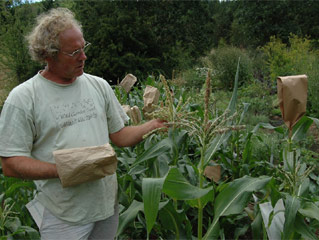Is the threat of losing markets causing farmers to not discuss GMO contamination?
By Ken Roseboro
Published: May 1, 2012
Category: GMO Contamination

Frank Morton, owner of Wild Garden Seeds
To access all the articles in this month's issue of The Organic & Non-GMO Report, SUBSCRIBE NOW.
Oregon organic seed producer losing business because of GMO threat
Organic farmers have lost money when their crops were contaminated by genetically modified crops and rejected by grain buyers. But an organic seed producer in Oregon is losing business because of the threat of GMO contamination.
Frank Morton, owner of Wild Garden Seeds, produces vegetable seeds in Oregon’s Willamette Valley where seeds for GM Roundup Ready sugar beets are grown. Pollen from the GM beets can cross-pollinate and contaminate Morton’s organic table beets and Swiss chard crops.
Morton tests his crops for GMOs, and to date, there hasn’t been any contamination. Yet he has still lost business.
“I’m losing business because of the perception of contamination,” Morton says. “No one is buying rhubarb chard from me. Also people used to buy bull’s blood beet seed from me and now they buy from another seed company in Washington.”
Overall, Morton says his business has been down since 2009.
He says people whose crops are contaminated by GMOs are stigmatized. “You can lose your reputation from contamination or even the threat of contamination. I think that is unfair.”
Morton is a plaintiff in a 2008 lawsuit against the US Department of Agriculture to overturn the approval of GM sugar beets. A judge ordered the USDA to conduct an environmental review of the beets, which the agency has done. USDA recommends allowing unrestricted plantings of GM beets as it did before the lawsuit.
The threat of losing markets may be dissuading other farmers from reporting GMO contamination problems. In 2010 a group of Midwest organic corn farmers whose crops tested for low levels of GMO contamination did not want their names made public fearing the problem would hurt their markets.
Lynn Clarkson, president of Clarkson Grain, which supplies organic grains, agrees.
“If you talk about it, people think you have a problem. Farmers don’t want to be on anyone’s black list.”
Clarkson says that entire nations, particularly in Europe, stopped buying corn and soybeans from the US because of the GMO contamination threat.
Morton says the biotech industry points to him as an example of why it is better for farmers to not say anything about contamination. “The other side’s opinion is that Frank Morton talks too much. If he shut up, he wouldn’t lose business.”
© Copyright The Organic & Non-GMO Report, May 2012




